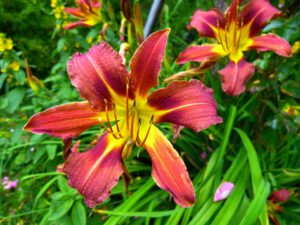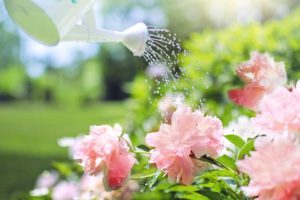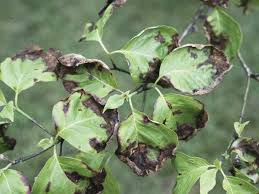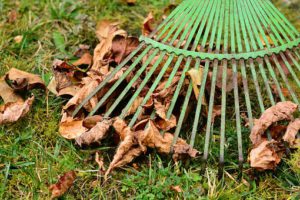12 Ways to Garden in Harmony with Nature

Wouldn’t you love a garden without the use of pesticides and synthetics, a garden that’s growing all-natural the way nature does it? many home gardens are using natural means to grow such gardens which are sustainable by using natural methods that’s environmentally safe bringing balance to our ecosystem.
This type of garden method can be looked at as smart gardening. As a gardener for more than 25 years, I have worked on many garden projects both out and indoors and have seen what can happen when a garden that is properly planned not only for beauty or an edible garden but a garden that can be sustained using natural ways in growing plants that are healthy helping wildlife along with beneficial insects to do their part to ensure that we not only reap a good harvest but providing a home in which wildlife can raise their young.
When we garden in harmony with nature we will not only be creating an all-natural look as if no human efforts were involved but we will be in a position to garden without the use of synthetics (man-made) products.

1. The right location
The right location is a must to grow healthy plants, different plant species have their lighting requirements. If a plant’s light requirements are not meant will become sickly which will encourage garden insect pests.
When this happens chemicals may be introduced to bring insect pests under control but once plants are placed in the right location will help your garden plant to thrive. Even if garden insect pests show up in your garden because of the right location your garden plants will still thrive as long as you apply step five.
2. Garden soil
Growing plant naturally requires the right soil type, good garden soils are at the root of plant life and if plants are not getting their preferred soil will decline encouraging disease and garden insect pests. Gardening naturally then means the right location along with the preferred soil for plant species.
3. Water requirement

Nature knows how much water to give plants (rain) which means in order for garden plants to grow naturally we also must know their water requirements. Many plants mostly when it comes to container gardening die because either of overwatering or a lack of water so do as nature does and know your garden plant watering needs.
4. Plant nutrients
Gardening naturally in harmony with nature means ensuring that your garden plants are getting the needed nutrients naturally. Synthetics are made-made nutrients whereas organics are natural.
There are many organics that are sold but can be pretty costly, to be able to take advantage of organics why not consider starting a compost pile or using organic materials such as grassing clippings that are disease and weed-free along with leaves which will breakdown overtime enriching the soil and providing plant nutrients.
5. Pesticides
Although pesticides can get the job done, misuse of harmful pesticides can contaminate the air, the water system along with killing off beneficial insects and contaminate foods if we are growing an edible garden.
By following what we have laid out will limit the use of pesticides, but if you must use pesticides why not use homemade remedies or consider organic pesticides. Before purchasing however read the label to ensure you are getting the right organic pesticide for the job also read the label before applying.
6. Pollinators
We can plant in such a way to have pollinators visit our gardens, these guest (pollinators) are always invited because of the major contribution they bring in helping our garden plants.
Here are a few plants to consider when seeking to attract pollinators. Cosmos, zinnias, lantanas, lavender, black-eyed Susan, aster, daisy, marigold, sunflowers, dandelion, dahlia, etc…
7. Planting by zone
There are so many species of plans to choose from but remember don’t only go for beauty. Chose plants that will grow in your zone, this is one of the mysteries of nature.
Plants that are not suited to your zone will cause you time spent and money (wasted efforts). So before choosing plants ensure they can thrive in your area. As a rule, to go by however install plants that are native to your zone, it makes the best choice.
8. Know what you are buying

Knowing what to buy will save a lot of headaches and a few bucks as well. Before making a purchase do a thorough inspection of the plants that are chosen. So many times persons have brought disease plants placing them in their gardens which was a huge mistake.
Introducing disease plants into your garden will not only put your healthy plants at risk but may cause you to dig deeper (spending more) seeking to find ways to bring plant disease under control.
Here are a few signs to look for, if the leaves are discolored, dropping, water-soaked, if there are signs of insects on the leaf surface and also on the undersides of leaves if leaves are thorn if roots are wet or soaked and mushy with a bad odor stay clear of such plants no matter how great the deal is or how cheap the price tag maybe this will cause you more in the long run.
9. Plant disease resistance varieties
Planting disease-free resistance varieties are a great way of growing a garden that is easy to care for. These disease resistance varieties will discourage the use of chemicals because of these plant types being able to fight disease naturally which will also give you savings.
10. Planting too closely
Planting too closely will encourage poor airflow that will lead to disease, getting to know the diameter or size of your plants at maturity is a great place to start when installing them. The right spacing of plants will encourage proper air circulation that will lead to healthy plants
11. Keeping the plant bed clean

Keeping your garden plant bed clean and free of debris can be looked upon as keeping your house clean. A house that’s cluttered and dirty will not only look unattractive but overtime it will encourage rats and roaches and eventually lead to decline.
The same is true when it comes to our gardens if we don’t keep those plant beds free of debris will look unattractive along with encouraging disease and garden insect pests so let’s keep our garden plant beds as debris and clutter-free as much as we can.
12 mirroring nature
Mirroring nature is a great and natural way to work in harmony with nature. This method is not a must but can be used as an aesthetic if preferred to create a pleasing design.
Adding a few big rocks spaced evenly apart in your garden or a large tree branch or log or mixing it up will work wonders. Just remember to have fun and do it the way nature does it.
The final word on how to garden naturally
Gardening naturally is the natural and best way to go, this type of gardening has so many benefits as we have discussed, and can be looked at as smart gardening. So why not consider a garden of this sort as you work in harmony with nature bringing balance to the ecosystem along with protecting the many wildlife including beneficial insects and helping to keep our environment contaminate-free.
About the author
Norman loves being in the garden, both at home and for his job....
he is 'Natures Little helper' being outdoors, growing his vegetables and flowers from an early age.
Now having spent over 22 years in the profession he want to give some of his knowledge to others...
his vast array of hints and tips you will find scattered over this site will help you no end growing plants in your garden.

This is a lovely site offering some excellent gardening advice, particularly appropriate with the summer now in Europe. You have highlighted some really important advice that is helpful to me as we are moving to a new house soon. The right location, climate, soil, water, nutrients, and a wide range of other features, most of which you cover, were important reminders to this slightly neglectful gardener from the past. But now reaching retirement, I anticipate having more time to work in the garden. The pollinators point was particularly helpful for me to understand the garden better. I have saved your URL so I can return to visit once we set up the new house. Do you have any advice with regards to how long waste organics should be left before being added to soil as compost?
Hello and thanks so much for your kind words. I am so happy to help. You can check out this post that I wrote sometime back but the information is useful and will prove to give good results. Wishing you all the best and have a good day.
https://staging-gardenofedengardencenter.siterubix.com/starting-a-compost-pile#more-832
Hi and thanks for this. We have had varied experiences with our vegetable garden that have yielded dramatically different results from one year to another and often we are frankly somewhat baffled trying to work out what we did differently. This year, for example, none of the early produce came through, and yet we were careful to plant at the right time and not to overcrowd or overwater. Many years ago I read a great deal about permaculture, it seemed there was a wave of interest in the subject and many fun projects were underway and books were being published. That was all about mimicking nature and trying to grow food with minimal effort avoiding monoculture even in a small garden. Thanks again for a great article on this subject. Best regards, Andy
Hello, and thanks so much for sharing. This is one of the wonders of nature, all we can do is seek to do as nature does it. So sorry to hear about your early harvest, there could be many factors as to why you did not produce a harvest. Going through the process of elimination can help. Wishing you good success with your garden project and thanks so much for your kind words. All the best to you and have a good day.
Thanks for sharing this post on gardening. I would love a garden without the use of pesticides and synthetics, a garden that’s growing all-natural the way nature does it. I agree with you cause the use of these chemicals can be dangerous to man as a whole besides like you said the garden is natural, the food will be ingested so it makes more sense that way. All the best
You are welcome, going natural is always better I am so happy that I could help.
I keep putting off starting my garden because I have no idea where to start. I began a compost pile this past fall but don’t know where to place the garden. Should I do a garden box or in the ground? How can I keep creatures away? How do I find the best soil?
Should I turn the soil and let a season pass or can I plant right away? There’s some good information in this article that gives me the confidence to begin.
I now know how to organically feed my garden and keep away pest the natural way! Can’t wait to get started on my garden. Thank you for sharing and hope to hear from you on the best way to locate proper soil.
Shannon
It is so good to hear that you are starting a garden if you are asking about a raised bed garden then that would be great. To find the best soil shop around garden centers, look for coupons that will give you a deal on garden soils.
You can cover the bin with mesh wire, what about putting wooden pallets on top of the bin, these are heavy, covering the holes with mesh wire or cloth should help also in keeping creatures out. As a rule, to go by, the soil should be turned every 3-4 days.
Base on the size of the compost pile and the amount of organic that needs to break down probably waiting for a season would be better what you want is to ensure that all of the organic material breaks down completely. Hope this help and all the best to you.
Thanks for the reply! Let’s say I want a garden in my yard in the ground. How do I know if the soil is good?
And do you have examples of what the mesh/bin cover would look like?
Hate to be a pest but thanks for answering.
Shannon
This is a good ‘how-to guide on organic gardening’. I do try to use these techniques in my garden as much as possible. I found the natural and home remedies useful for controlling many insects except Japanese beetles and lanternflies. I also try to attack pollinators using those plants that you have listed. I have also tried other plants such as the butterfly bush and hibiscus to attract hummingbirds to my garden. I strongly believe incorporating these natural gardening techniques you have discussed will facilitate the maintenance and balance in the ecosystem.
Gardening naturally only makes sense, if we do it the way nature does it we will be stepping in the right direction because of the many benefits this garden type offers. So good to see you are going the natural way also. Wishing you the best of success.